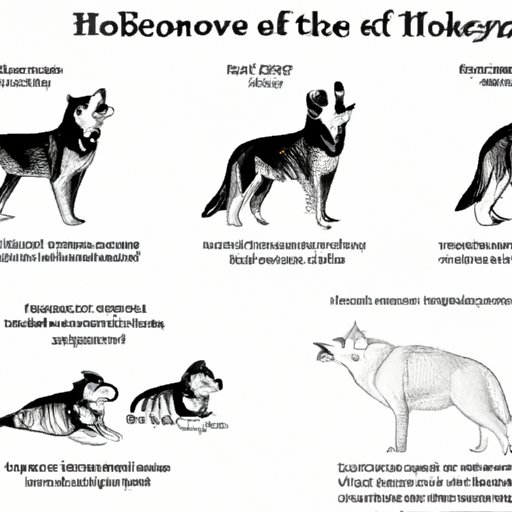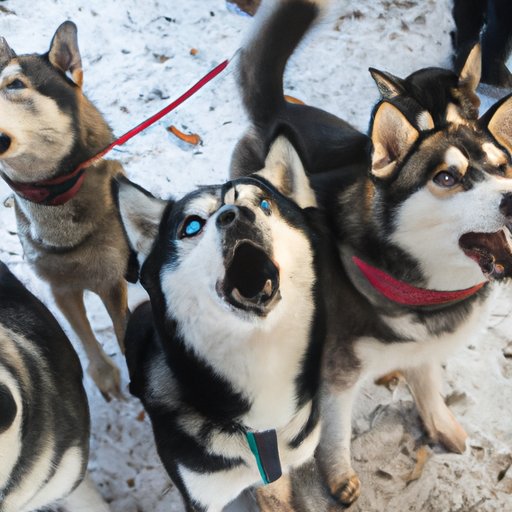Introduction
Have you ever heard the haunting beauty of a husky howl? There’s something unique and captivating about this wild-like vocalization, and it’s one of the reasons why huskies are such a beloved breed. But why do huskies howl, and what do their vocalizations actually mean? Understanding the reasons behind these vocalizations can help you better communicate with your husky, care for them, and train them. In this article, we’ll dive deep into the scientific and emotional aspects of husky howling, discuss the history of this fascinating breed, and provide tips and tricks for managing husky vocalizations.
The Reason Behind the Song: Understanding Husky Howling
First and foremost, it’s essential to recognize that husky howling is a biological response. Huskies are descended from wolves, and howling is a natural form of communication for both species. In the wild, wolves and other related canids often howl to communicate with other pack members, establish territory, and locate prey or other pack members. In domesticated huskies, howling is often an innate response to environmental triggers such as certain sounds, sights, or smells.
Another reason why huskies howl is related to their pack mentality. Huskies are social animals and rely on communication to interact with their owners and other dogs. Howling, along with other vocalizations, can help huskies express their emotions, send messages, and establish dominance or submission within a pack. When huskies howl, they are trying to communicate something, and it’s up to their owners to decipher what that might be.
Decoding the Howl: What Your Husky is Saying Through its Vocalizations
To better understand what your husky is communicating through their vocalizations, it’s essential to analyze the different types of howls. There are three primary types of husky howls:
- The Standard Howl: This is the most traditional husky howl, and it can be long and drawn out or short and sharp. Often, huskies use this type of howl to communicate with other dogs or express excitement or distress.
- The Whine: Huskies will often use a short, high-pitched whine to communicate excitement or frustration. This type of howling is also common in puppies who are trying to understand their world.
- The Woo: This type of howling is often characterized by a shorter, higher-pitched sound. Huskies may use this when they are greeting loved ones or trying to get attention.
Understanding what type of howl your husky is using can help you better understand what they are trying to communicate. For example, if your husky is using a long-drawn-out howl, they might be trying to connect with another dog in the neighborhood, but if they are using short, sharp howls, they might be feeling upset or anxious.
But it’s important to remember that context also matters when it comes to husky howling. For example, a husky may howl when they are excited to go for a walk, but they may also howl when they are in pain or feeling scared. Learning to interpret your husky’s vocalizations requires careful listening and a willingness to understand your pet’s unique personality and communication style.

The History of Husky Howling: Tracing the Evolutionary Purpose of the Howl
To understand why huskies howl, it’s essential to look back at the breed’s evolution. Huskies are one of the oldest dog breeds, and they were originally used by the Chukchi people of northeastern Siberia as working dogs. These dogs were bred for their endurance, intelligence, and adaptability to the harsh Siberian environment.
Over time, huskies became a popular sled-dog breed, prized for their ability to tolerate extreme cold and navigate difficult terrain. Huskies would often howl as a way to communicate with their owners during long sled journeys, and human companions would also sometimes howl with their huskies as a way to pass the time or signal to other travelers.
But despite their long-standing history as working dogs, huskies remained relatively unknown in the Western world until the early 1900s when the first huskies were brought to Alaska for sled-dog racing. Today, huskies are beloved in many parts of the world for their beauty, energy, and intelligence, and their vocalizations remain an essential part of their charm.
Solving the Mystery: Unraveling the Science of Why Huskies Howl
Despite the long history of husky howling, there is still much we don’t know about why huskies howl. Scientists have conducted many studies on howling in different canine species, including wolves, foxes, and domesticated dogs, but the research on husky howling is still relatively limited.
That said, there are a few scientific theories surrounding why huskies howl. Some experts speculate that howling is a way for dogs to communicate with each other across long distances, allowing them to locate each other without necessarily being in the same place. Others suggest that howling is a way for dogs to express strong feelings or emotions, including excitement, frustration, or fear.
Ultimately, more research is needed to understand fully why huskies howl, but what we do know is that howling is a natural and instinctive behavior that is part of the husky’s unique personality and heritage.
The Emotional Side of Howling: Investigating Why Huskies Howl When Left Alone
One of the most common reasons why huskies howl is anxiety or loneliness when they are left alone. This type of howling is often called separation anxiety, and it’s a common behavior among many dog breeds. Huskies, in particular, are prone to separation anxiety because they are social animals that thrive in the company of their owners and other dogs.
If your husky is howling excessively when you are away from home, there are a few strategies you can try to reduce their anxiety. These include:
- Providing your husky with plenty of mental and physical stimulation before you leave the house. This could include playtime, walks, or puzzle toys.
- Creating a comfortable and cozy space for your husky to relax while you are away. This could be a designated crate or sleeping area that is familiar and smells like you.
- Gradually desensitizing your husky to being alone by leaving the house for short periods and gradually increasing the amount of time you are away.
- Using calming sprays, pheromone diffusers, or natural remedies like lavender to help soothe your husky’s anxiety.
It’s essential to understand that separation anxiety can be a serious issue for some huskies, and you should always consult with a veterinarian or animal behaviorist if you are concerned about your pet’s well-being.
Training Your Husky Not to Howl: Tips and Tricks for Managing Vocalization Behaviors
If your husky is howling excessively at inappropriate times, there are a few training strategies you can try to manage this behavior. These include:
- Teaching your husky alternative forms of communication, such as barking or whining, when they want attention.
- Encouraging good behavior by rewarding your husky with treats or affection when they are quiet or calm.
- Ignoring your husky’s howling behavior so that they don’t associate it with getting attention or treats.
- Using positive reinforcement techniques to help your husky learn when it’s appropriate to howl and when it’s not.
- Enrolling your husky in obedience training classes so that they learn good behavior in a structured and supportive environment.
It’s important to remember that managing vocalization behaviors is an ongoing process, and there is no one-size-fits-all solution. You may need to try several different training techniques to find what works best for your husky. Above all, be patient and persistent, and always reward good behavior!
Conclusion
Husky howling is an essential part of this unique and fascinating breed’s personality and heritage. These wild-like vocalizations serve a variety of biological and emotional functions for huskies, and understanding what your husky is trying to communicate through their howls can help you better care for, train, and communicate with your pet. Whether your husky is howling out of excitement, anxiety, or a desire to connect with other dogs, there are strategies you can try to manage this behavior and ensure that your husky is happy and healthy.
